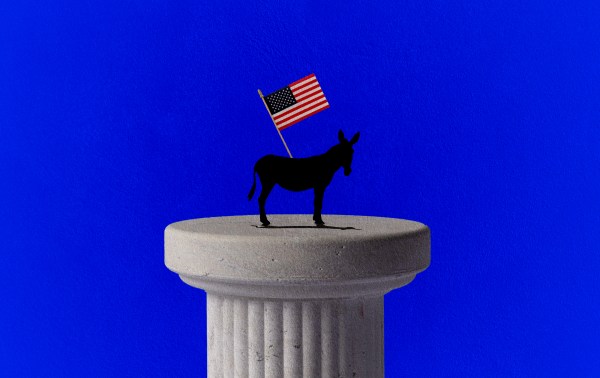It is easy to make fun of Dan Bongino, the emotionally incontinent former cop turned podcaster appointed for some inexplicable reason by Donald Trump to serve as deputy director of the FBI as a subordinate to Kash Patel, whose main qualification for the job was having been the author of ... a children’s book about the Steele dossier, a fact that sounds totally made-up but that is totally not made-up.
And it is a good week for making fun of Bongino, who recently had a public emotional breakdown on Fox News—where else?—about how he “gave up everything” to take on a thankless job in public service. About which: Bro, you gave up a podcast. Bongino went on to say that the job was so hard that he was now divorced from his wife, only to realize that he didn’t exactly mean what he said. The bombastic mode of speech that is apparently obligatory in Trump’s orbit had served him poorly, and so he corrected himself: “separated.” But he didn’t mean “separated” the way it sounds when it is used in conjunction with “divorce.” He just meant that he’s spending a lot of time at the office away from his family.
“I gave up everything,” the poor dear says. But how did he get that everything he’s missing? As much fun as it is to make fun of social-media tough-guy crybabies such as Bongino, there is a more serious point in there.
I believe the first time I wrote about Bongino was after he decided to be a radical libertarian for five minutes and declared: “Taxation is theft.” And “Taxation Is Theft” is a very strange slogan for a man who had spent almost the entirety of his career as a tax-eater, happily enjoying a salary and generous benefits paid for by—maybe he didn’t know?—taxation. Not only was Bongino a taxpayer-supported public employee, he was a member of the very class of taxpayer-supported public employees—cops—that they send to your house if you decide to take “Taxation Is Theft” seriously and resist the thieves. (We may dress our police up as commandos and tell them that they are “at war” with drugs or gangs or whatever, but, in reality, they are mostly tax collectors of one kind or another.) Radical rhetoric like “Taxation Is Theft” is tempting, and I have overindulged in it myself from time to time, although there is a key difference between me and Bongino on this matter:
I believe it.
(I don’t want to go off on a whole thing about my own political ideas here, but the short version is that I think that any healthy society consisting of more than about 15 people is going to be characterized not by the pursuit of perfect justice but by the prudent, thankless, and unsatisfying work of balancing competing injustices; taxation is a real and meaningful violation of property rights necessitated by other even more unpleasant realities such as the practical requirements of collective self-defense. Philosophically, I’m adjacent to the anarcho-capitalists; practically, I’m an Eisenhower Republican, which is one of the reasons I haven’t had anything to do with the thing that still calls itself the Republican Party for about 20 years now.)
Bongino, by most accounts, was a competent and dutiful if not particularly distinguished policeman with the NYPD and a similarly competent and dutiful if not particularly distinguished Secret Service agent. (The radical libertarian in me agrees with the Eisenhower Republican in me that “Secret Service” is a terrible, wildly inappropriate name for a police agency in a free society. But never mind that for now.) Bongino may inflate his past importance from time to time, but there isn’t anything in the world wrong with being an ordinary government employee who tries his best to do a good job—we’d be a lot better off if there were more of them trying their best.
And there isn’t anything wrong with cashing in on that experience by means of a private-sector career later in life, which Bongino has done, by his own telling, quite splendidly. While it is not the case that most people in government are taking a huge pay cut vs. their likely private-sector earnings as a generous and patriotic act of public service (accounting for total real compensation, many people in the public sector earn much more than they likely would in private industry), the possibility of using a career in government to acquire experience, relationships, and prestige that can be monetized later in life is part of the deal for a lot of good people who go into government work, and, again, there isn’t necessarily anything wrong or dishonorable about that.
But that is The Swamp.
That’s how Washington works, mostly. People don’t get paid from shadowy backroom deals and anonymous calls on burner phones. You work for the Fed as a bank regulator for ten years, work on the other side at a bank for five or 10 more, go back to the Fed or some other agency in a more senior role, and then back to the private sector in a high-level position. Maybe there are a few more steps in the back-and-forth, but that’s the standard practice. What Bongino is doing—and whining about!—is the swamp-thing two-step.
Gross quid pro quo corruption is not unheard of in Washington—Sen. Robert Menendez richly deserved his bribery sentence and probably should have received a longer one if only for embarrassing Americans by publicly demonstrating how a senator may be had so cheaply—but it is much rarer than many people assume. What people think of as corrupt—morally if not legally—is the swampy revolving-door career path, the exploitation of one’s former position and contacts to make money in a purely self-interested way after leaving government—or, as in Bongino’s case, between feeding sessions while tearily attached to the taxpayers’ teat.
We want good people in government. And let’s assume that Bongino the cop and Secret Service agent was a man of more integrity and higher character than Bongino the media celebrity and full-time, knee-walking, gormless Trump sycophant. Respectable work in the NYPD and the Secret Service is perfectly honorable, and we ought not to sneer at it or begrudge former policemen or federal agents some book royalties or podcasting revenue. But: Are there no honorable men and women in the FDA? Working for the Federal Reserve? In the DOJ? At HUD? Beavering away in the basements at Treasury or HHS? No honorable Hill staffers? No honorable Democrats? Of course there are. And when they go on to cushy academic appointments or lucrative lobbying careers or whatever, and then maybe parlay that private-sector success into even more senior government posts conferring prestige and influence that can later be milked upon returning to the private sector, that tangled mess of relationships and mixed-up financial incentives is what Bongino and others like him call The Swamp.
If anything, the Hill staffers and ex-bureaucrats are, as a group, probably less corrupt than are those employed in the agencies where Bongino had his career: NYPD has been infected by such wild corruption at points in its long history that certain of its constituents have been indistinguishable from organized-crime syndicates—within my lifetime, we have had NYPD officers acting as Mafia hitmen, while the catalogue of scandal at the Secret Service is long and amusingly pornographic. Bongino is hardly the first NYPD veteran or Secret Service agent to cynically cash in.
The question that interests me—and I do not mean this facetiously—is whether Bongino and others like him are simply too stupid to understand that they are The Swamp.
For example, Bongino has described the FBI—the agency he is entrusted with helping to lead—as “irredeemably corrupt.” As I wrote above, these guys all talk like idiots who have just watched Glengarry Glen Ross for the 55th time, and it is probably the case that Bongino’s rhetorical flourishes have once again carried him away. If he genuinely believed that the FBI was irredeemably corrupt, then he would not waste his time on the impossible project of trying to reform it, if he were a man of integrity acting in good faith. Irredeemably means something. On the other hand, if he were a purely cynical and self-serving calculator, then doing a stint at the FBI would be worth something: A dishonest man coming out of a senior management role at the FBI could milk the conspiracy nuts and rage-monkeys for millions in book sales and appearance fees promising to expose the secrets that “they—THEY—don’t want you to know.”
My guess is that, yes, Bongino belongs to the set of those who are too stupid to understand. I do not think that such energetic, sanctimonious, and utterly unexamined self-righteousness is the kind of thing that even a genuinely wicked person can fake for so long. Even as they grab money with both hands as fast as they can like a contestant in a money booth on some grotesque game show, there is a genuine sense among these Trump sycophants that what they do isn’t corrupt when they do it. Trump’s own brazen campaign of personal enrichment is the sort of thing that would have given Bongino an aneurysm if Joe Biden had been doing it, as is the administration’s frank policy of more or less auctioning off pardons in exchange for money and favors. There is no crime that cannot be set aside for Trump supporters: Ed Martin, Trump’s pardon attorney, unapologetically described the administration’s policy: “No MAGA left behind.” That includes corrupt former cops such as Scott Jenkins, a former Virginia sheriff convicted of taking bribes, as well as men on the other side of the law such as Larry Hoover, the founder of what is arguably the single most significant criminal enterprise in these United States, a gang whose many affiliates and offshoots (maybe you’ve heard of the Crips?) are responsible for who knows how many thousands of murders.
Corrupt cops, Chicago gangsters—put on the dopey red cap (or, in Hoover’s case, have Kanye West wear the cap on your behalf) and you’re above the law, at least as a federal matter. (Like Donald Trump, Larry Hoover still has state-level legal issues outstanding.)
That’s outrageous stuff, to be sure. But what about more ordinary swampery? What should we do about it? Should we do anything about it? I don’t know that there is much that could be done: The Obama administration tried to put a brake on the revolving door by means of executive orders and barring lobbyists from certain senior roles—a policy that did not survive very much contact with the facts of Washington life. Trump had a similar rule and rescinded it on his last day in office, because that’s the kind of cowardly fink he is. And, in a free society with a dynamic economy, people are going to move around and do a lot of different things—this isn’t life in some 19th century European country or Nathaniel Hawthorne’s Custom-House, where a clerk in a government office expects, and is expected to, remain there for life.
Words About Words
From “The Custom-House,” the preface to The Scarlet Letter:
I doubt greatly—or, rather, I do not doubt at all—whether any public functionary of the United States, either in the civil or military line, has ever had such a patriarchal body of veterans under his orders as myself. The whereabouts of the Oldest Inhabitant was at once settled, when I looked at them. For upwards of twenty years before this epoch, the independent position of the Collector had kept the Salem Custom-House out of the whirlpool of political vicissitude, which makes the tenure of office generally so fragile. A soldier,—New England’s most distinguished soldier,—he stood firmly on the pedestal of his gallant services; and, himself secure in the wise liberality of the successive administrations through which he had held office, he had been the safety of his subordinates in many an hour of danger and heart-quake. General Miller was radically conservative; a man over whose kindly nature habit had no slight influence; attaching himself strongly to familiar faces, and with difficulty moved to change, even when change might have brought unquestionable improvement. Thus, on taking charge of my department, I found few but aged men. They were ancient sea-captains, for the most part, who, after being tost on every sea, and standing up sturdily against life’s tempestuous blasts, had finally drifted into this quiet nook; where, with little to disturb them, except the periodical terrors of a Presidential election, they one and all acquired a new lease of existence. Though by no means less liable than their fellow-men to age and infirmity, they had evidently some talisman or other that kept death at bay. Two or three of their number, as I was assured, being gouty and rheumatic, or perhaps bedridden, never dreamed of making their appearance at the Custom-House, during a large part of the year; but, after a torpid winter, would creep out into the warm sunshine of May or June, go lazily about what they termed duty, and, at their own leisure and convenience, betake themselves to bed again. I must plead guilty to the charge of abbreviating the official breath of more than one of these venerable servants of the republic. They were allowed, on my representation, to rest from their arduous labors, and soon afterwards—as if their sole principle of life had been zeal for their country’s service, as I verily believe it was—withdrew to a better world. It is a pious consolation to me, that, through my interference, a sufficient space was allowed them for repentance of the evil and corrupt practices into which, as a matter of course, every Custom-House officer must be supposed to fall. Neither the front nor the back entrance of the Custom-House opens on the road to Paradise.
The greater part of my officers were Whigs. It was well for their venerable brotherhood that the new Surveyor was not a politician, and though a faithful Democrat in principle, neither received nor held his office with any reference to political services. Had it been otherwise,—had an active politician been put into this influential post, to assume the easy task of making head against a Whig Collector, whose infirmities withheld him from the personal administration of his office,—hardly a man of the old corps would have drawn the breath of official life, within a month after the exterminating angel had come up the Custom-House steps. According to the received code in such matters, it would have been nothing short of duty, in a politician, to bring every one of those white heads under the axe of the guillotine. It was plain enough to discern, that the old fellows dreaded some such discourtesy at my hands. It pained, and at the same time amused me, to behold the terrors that attended my advent; to see a furrowed cheek, weather-beaten by half a century of storm, turn ashy pale at the glance of so harmless an individual as myself; to detect, as one or another addressed me, the tremor of a voice, which, in long-past days, had been wont to bellow through a speaking-trumpet, hoarsely enough to frighten Boreas himself to silence. They knew, these excellent old persons, that, by all established rule,—and, as regarded some of them, weighed by their own lack of efficiency for business,—they ought to have given place to younger men, more orthodox in politics, and altogether fitter than themselves to serve our common Uncle. I knew it too, but could never quite find in my heart to act upon the knowledge.
As Ezra Pound once put it: “Literature is news that stays news.”
More Wordiness
Some questions answer themselves: “Do talking animals deserve human rights?” asks a headline over at Salon. Well, what kind of rights? Also: There are no talking animals.
And Furthermore ...
The fashion critic over at the New York Times begs the question: “The idea that any designer has a say over who wears its clothes is kind of foolish, given that if someone can afford an item, they can simply walk into a store and buy it. At the same time, it is fashion’s job to respond to social and political currents.”
Why?
Why should it be “fashion’s job to respond to social and political currents”? Why shouldn’t clothing designers and sellers spend their professional time designing and selling clothes—acting within their areas of competency—rather than monkeying around in politics, where they have no special competency? We see this all over the place, with different professions and institutions being asked to take on this or that unrelated issue. The National Poetry Foundation broke itself against the rocks of race politics—and, given the state of national poetry, it could hardly afford to broaden its focus. Architects’ professional associations insist that their members must take the lead on climate issues, which might seem to make a little sense until you learn how few buildings are built with any input from an architect, how little influence architects have over their clients, how little all of the green bells and whistles actually contribute to the energy efficiency of modern buildings, etc. Many car companies have taken a meat ax to their own margins by getting carried away with the green stuff, too, trying to force electric cars on customers who do not desire them. Humanities departments have ruined themselves with politicized curricula and voguish social-justice nonsense. So many journalists have gotten caught up in saving the world that they forgot how to report the news and make money publishing newspapers.
There isn’t any inherent reason fashion can’t be ars gratia artis (et pecuniae). Yohji Yamamoto, who has a real genius for clothing, has been heard to scoff at the notion he is some kind of artist. As he once said, “I am a dressmaker!”
I do not know a great deal about fashion designers. I know a little about poets. And do you know what kind of poet gets most caught up in social activism? The mediocre kind. I suspect the same is true for many other creative (and less creative) occupations: The middling kind of writer or academic or designer doesn’t produce the kind of work that offers much of interest in itself, and so it must be supported by the prosthetics of politics and political activism.
Economics for English Majors
It’s TACO time!
President Donald Trump traveled to Pittsburgh Friday to celebrate a deal he once vowed to oppose—Japanese steelmaker Nippon Steel’s long-announced plans to buy iconic American steelmaker US Steel.
“We’re going to be so successful. You have just, you have just started, you watch, we’re here today to celebrate a blockbuster agreement that will ensure this storied American company stays and American company, you’re going to stay in American company,” Trump said at a US Steel plant just outside of Pittsburgh, before an audience of steelworkers in hard hats and safety vests.
And he also announced he is increasing the tariff on imported steel from 25% to 50%.
There’s an interesting twist—a big tax on Americans to protect Japanese steel interests. Weird kind of protectionism, dude.
Trump insists that what’s going on with Nippon Steel and U.S. Steel is a “partnership.” It’s not—Nippon Steel is buying U.S. Steel, as planned.
Years ago, I got chewed out—and, I suspect, very nearly fired—when I wrote a headline at the Lubbock Avalanche Journal dutifully reporting that a local bank was being acquired by another bigger bank. The head of the local bank—a big advertiser at the time—was furious, and called my editor to complain. His bank wasn’t being acquired, he complained, it was a “merger of equals.” That bank was called Norwest. I don’t think many of you will have heard of it.
Have you heard of Wells Fargo?
Merger of equals. Sure.
Elsewhere
You can buy my most recent book, Big White Ghetto, here.
You can buy my other books here.
Please subscribe to The Dispatch if you haven’t.
You can check out “How the World Works,” a series of interviews on work I’m doing for the Competitive Enterprise Institute, here. My most recent conversation is with Mike Masnick, the founder of Techdirt, and a very interesting guy. I think you’ll enjoy our conversation.
In Closing
Jay Nordlinger, reporting from the Oslo Freedom Forum:
Speaking of assimilation: I’m about to cross the street. I have one foot in the road. But then I catch myself. There are children, waiting with their parents, on my side. There are children on the other side, too—waiting with their parents. There is not a car in sight. But the light is against us. And these people are finna wait till the light turns green, come what may.
My American feet itch to cross. But I cannot set a bad example for the children. (“Mommy, why is that man doing that?”) So I wait, dutifully.
So unnatural. But I’m trying to be a good Norwegian, or a good visitor …
I had the same experience in Zurich at 3 a.m., with adults coming home from a rave rather than with children. The light says wait, and wait they will. I don’t hate that aspect of Swiss culture or of Scandinavian culture; in fact, I admire it. But I kind of suspect it is why they don’t have our venture-capital industry and haven’t been to the moon.
In the wee hours, Zurich after Street Parade—in which a million people come to the Swiss city (pop. 423,000) to dance to techno music and do most of the things that go along with that—looks a little like New Orleans after Mardi Gras. But when I got up to go to church the next morning, Zurich looked like … Zurich, as though nothing had ever happened.
The social planners dream of picking and choosing from various national characteristics and institutions and, at the worst, delude themselves into thinking that they can: We want the American start-up economy, the Swiss health care system, the Finnish school system, Hong Kong’s public transport, the United Kingdom’s newspapers, Germany’s factories, Singapore’s bureaucracy. We want to somehow have Iceland’s natural beauty together with Houston’s zoning laws. The people who are skeptical of the social planners know that cultures are package deals. You want Dubai, you get … all of Dubai. You want Texas, you get … Texas, for better and for worse.
Norway is lovely. And it works well enough for the Norwegians. If you haven’t been to Oslo, I recommend it.
Bring money.







Please note that we at The Dispatch hold ourselves, our work, and our commenters to a higher standard than other places on the internet. We welcome comments that foster genuine debate or discussion—including comments critical of us or our work—but responses that include ad hominem attacks on fellow Dispatch members or are intended to stoke fear and anger may be moderated.
With your membership, you only have the ability to comment on The Morning Dispatch articles. Consider upgrading to join the conversation everywhere.